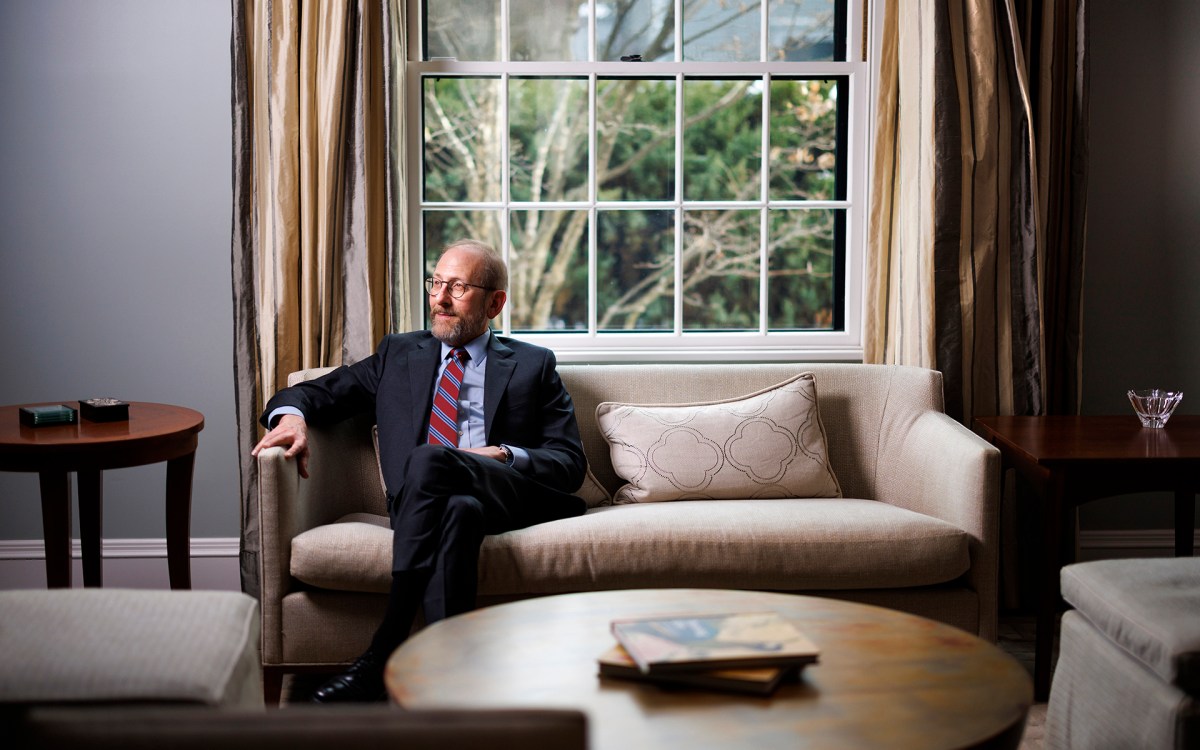
Senior year can carry extra stress as the demands of thesis research, worries about job prospects, or grad school applications start to pile up. Fortunately, Harvard offers seniors a wealth of resources to help them manage the stress of the transition and get as much from their last year at the College as they have from their first three.
Stephanie Mitchell/Harvard Staff Photographer
Senior relief
Services help undergrads manage stress in a time of transition
Margie Thorp ’11 works to make Harvard a less stressful place. As a student mental health liaison (SMHL), Thorp helps her classmates navigate the University’s network of resources for students under stress. When the demands of her senior year started to bear down on her last fall, however, Thorp realized that she needed to take some of her own advice and make an appointment at Harvard’s Bureau of Study Counsel (BSC).
“In the fall, I found that I was just thinking about plans for graduation all the time,” she says. “It got in the way of doing my normal work, so I made an appointment at the bureau. They said it might be helpful to make lists about the future — what kind of work I’d be doing, where I’d be living, applying to medical school — all the unknowns that hadn’t fallen into place at that time. After a couple of visits, I was able to put together a tangible plan to deal with the things that were stressing me out.”
Senior year is a time for college students to savor their achievements and look excitedly to the future. For many, though, it’s also a time of slaving over thesis research and worries about job prospects or grad school applications. Fortunately, Harvard offers seniors a wealth of resources to help them manage the stress of the transition and get as much from their last year at the College as they have from their first three.
Abigail Lipson, BSC director, says that students find themselves looking backward and forward during senior year, often at the same time. This gives rise to a wide range of often contradictory feelings: excitement and sadness; uncertainty and hope; nostalgia and regret.
“It is a time of change and transition,” Lipson says, “and so it is natural to feel anxious in both senses of the word — ‘anxious’ meaning concerned or worried, and ‘anxious’ meaning eager to get started on a new endeavor.”
Thorp says that senior year is an inflection point in students’ lives, a time when they feel as though their identities are being renegotiated.
“You’re supposed to be different, and feel different, more ‘adultlike,’ when this year is over,” she says. “It’s this generalized, overall picture of ‘adulthood’ that feels very uncomfortable. Even students with clear heads and secure futures can feel anxious.”
Paul Barreira, the University’s director of behavioral health and academic counseling and an associate professor of psychiatry at Harvard Medical School, says that the feeling of being in-between youth and adulthood contributes to the uptick in anxiety that Harvard undergraduates report during senior year. The financial crisis and a sluggish economy have only added fuel to the fire.
“Even if seniors are excited about the place that they’re going to,” he says, “the transition is still anxiety-provoking, more so in the wake of the Wall Street meltdown and downturn in the economy. There are fewer jobs. Parents may have lost money and be unable to provide financial support. That anxiety trickles down.”
Thorp’s fellow student mental health liaison, Agnes Sibilski ’11, says that her classmates deal with tension in different ways, some healthy, some not.
“Many students resort to sports and exercise in order to maintain and deal with stress,” she says, “which is extremely important and valuable, not only for physical health, but also for one’s mental health. Some revert to drugs and alcohol or to sleep deprivation to combat lost or wasted time earlier in the semester, neither of which are good solutions.”
Barreira says that, while many students know about the dangers of substance abuse, few understand the importance of sleep. For seniors looking to manage stress and be their best, his first prescription is simple: Get a good night’s rest.
“It’s critical to get enough sleep,” he says. “When work piles up, students often stay up studying in their dorm rooms or at Lamont Library, but sacrificing sleep in order to get things done is a flawed strategy. Sleep loss actually lowers productivity. Pulling an all-nighter before an exam is also a big mistake, since lack of sleep impairs memory and concentration.”
For some seniors, though, bedtime means lying awake for hours thinking about deadlines, interviews, and graduate school applications. Lipson encourages these students to take advantage of the wide range of services and supports available at the College.
“Undergraduates have many resources to call on as they negotiate the challenges of senior year,” she says. “These include the Center for Wellness, the Bureau of Study Counsel, the Office of Career Services, their deans, their tutors and advisers, the Mental Health Services, and of course one another.”
Barreira encourages seniors to visit the recently relocated and expanded Center for Wellness (CFW) in Holyoke Center on a regular basis to keep stress in check. Director Jeanne Mahon says that CFW is a place where students can reduce tension and practice self-care.
“We promote balance in people’s lives through an integrative approach that focuses on the physical, emotional, and spiritual parts in each of us,” she says. “The center’s diverse and innovative programs, services, and initiatives are for the entire College community.”
Mahon says that the center’s services — which include acupuncture, massage, and other one-on-one services—can help students manage the physical and emotional stress of senior year, from blood pressure raised by tight deadlines and heavy workloads, to forearm pain from days spent texting and using a keyboard, to upper back and neck tension from long hours at a computer. Moreover, students can now qualify for substantial discounts on CFW services.
“We are here and [are] extremely affordable,” Mahon says. “We invite undergraduates — and seniors in particular — to take advantage of our wide array of offerings.”
CFW’s reach extends into every House and the freshman dorms, thanks to resident wellness tutors and to a recently established undergraduate group: the Stressbusters.
“The Stressbusters are a group of undergraduate students who give seated back rubs to their classmates,” Mahon explains. “They’re all trained by our massage therapists, and we give them a shirt to wear so that people know who they are. They started in Lamont Café, but we had to stop because we got so many requests for Stressbusters in the Houses and dorms, and also at events. The popularity of the group has just exploded since it started in March 2009. People love it.”
For students who need something more than simple stress relief, Barreira says that the College offers a well-staffed mental health service.
“The BSC and Harvard University Health Services house a staff of expert professionals available for academic and personal counseling,” he says. “In fact, we’re one of the best-staffed mental health services of any university in the country.”
Thorp appreciates the extent and quality of supports offered to undergraduates, but says that seniors often have difficulty acknowledging the impact of stress in Harvard’s high-performance environment. She says that she and her fellow liaisons will continue to raise awareness of the resources on campus, and to help students feel more comfortable about using them.
“It’s not always socially acceptable to come out and admit you need help,” she says. “It feels uncomfortable and unwelcome in a place with so many successful, talented, brilliant people. Trying to keep up means not letting on that you might struggle with things.”
To learn more about the support that Harvard offers undergraduates, visit the SMHL website HarvardSmiles.com.




